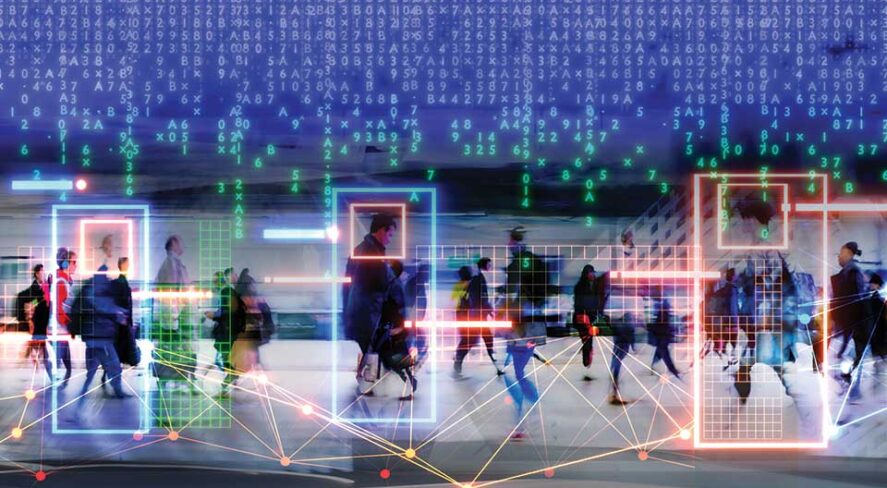How AI Can Transform Integrated Security

The potential is great, though challenges remain

The physical and cybersecurity world is dynamic and fast-paced, with security experts constantly looking for ways to automate, optimize and enhance their security efforts. In the rapidly evolving landscape of security services, one trend is clear: the move toward artificial intelligence (AI).
Since the invention of the internet, there has not been a new technology that has captivated its audience as quickly as AI. From health care to retail to education to manufacturing, AI has already affected nearly every industry, so it is no wonder that security would quickly seek to adopt the capabilities that it offers.
That said, the rapid development of AI tools includes a fair share of questions. How will this impact the way we work? What does it mean for the future? What is the role of AI in physical security? Will AI create jobs or eliminate them? For security leaders, the No. 1 question is: How can AI protect people, premises and assets?
To answer that question, it is useful to look at how AI has taken security from a reactive to a proactive era, making systems smarter than ever and boosting safety while improving convenience.
The Role of AI in Security
An integrated security system is a centralized platform combining various security solutions such as alarm systems, access control, video cameras and video analytics. The next-generation solution combines human expertise with cutting-edge automation to identify potential threats, respond with precision, minimize labor-intensive processes and improve overall security.
AI enhances security by providing real-time analysis, predictive capabilities and automation of routine tasks. AI for security solutions empowers security professionals and IT leaders to protect their organizations more effectively and streamline security operations.
AI plays a significant role in enhancing security across various sectors.
Threat Detection and Mitigation
When it comes to detecting threats, AI supports security efforts by analyzing patterns and identifying unusual activities that may lead to potential problems. With intrusion detection and prevention systems, AI helps to identify and respond to threats instantly, preventing incidents and mitigating damage and loss.
Adaptive Systems
Adaptive systems are technologies that can dynamically adjust and respond to changing conditions and potential attacks. Here, AI plays a crucial role in spotting anomalies in a wide variety of environments with precision.
For example, AI-powered analytics can be trained to identify specific objects and people and closely observe their movements. With access control, AI can identify individuals through facial recognition and authorize or deny entry.
Predictive Analysis
Not only can AI detect unusual activities and potential threats in real time, but analytics can predict security issues by examining historical data and identifying patterns that indicate vulnerabilities. This proactive approach helps organizations anticipate and prevent threats, reducing the likelihood of security incidents.
For instance, when securing a large venue with big crowds, AI can analyze crowd dynamics and detect unusual movements and overcrowding. This helps tackle potential issues before they escalate while regulating traffic flow. To secure a perimeter, AI analyzes data from sensors and security cameras, responds to unauthorized access attempts such as fence climbing, and triggers responses accordingly.
Proactive Security
AI enables proactive surveillance by analyzing video and flagging unusual activities, allowing operators to review the footage and take immediate action when a possible breach is detected. AI-powered analytics like real-time object and gun detection bring potential crimes to the attention of security teams, allowing them to immediately activate alarms or contact the authorities.
In access control solutions, AI can enhance security while streamlining management by analyzing entry attempts and preventing unauthorized access.
The Role of AI in Cybersecurity
AI can significantly enhance the efficiency of physical security and streamline processes. Similarly, security leaders can strengthen their cybersecurity programs and solve real-world problems by leveraging AI in multiple domains.
Network Security
AI can monitor and analyze network traffic in real time, strengthening network security and identifying suspicious activities like unauthorized access attempts or unusual data transfers. When these activities are detected, users can take immediate action to block or contain potential threats.
Endpoint Protection
Machine learning can identify and block malware, ransomware and other malicious software. It can also analyze user behavior to identify anomalous activities that could indicate compromised accounts or insider threats, helping to detect and prevent unauthorized access and data withdrawal.
AI-Powered Firewalls
Next-generation firewalls use AI to analyze networks and make real-time decisions on what traffic to allow or block. This dynamic approach enhances security by adapting to evolving threats. AI identifies potential threats using historical data and emerging trends to help firewalls prepare for new cybersecurity risks.
AI also leverages cloud-based security services to enhance firewall capabilities. Cloud resources are used for threat analysis, real-time updates and heavy computing tasks, providing a more scalable and responsive security infrastructure.
Incident Response
AI assists in the analysis of cybersecurity incidents and security breaches, helping IT teams to understand the scope, impact and origin of an attack. It also automates responses to incidents by isolating affected systems, blocking malicious activities and reverting systems to a secure state. Automating responses streamlines the process of mitigating and containing cybersecurity threats, putting a stop to an attack the moment it is detected and preventing it from impacting an entire network.
Vulnerability Management
AI is used to identify weak points in systems and applications. Automated vulnerability assessment tools powered by AI can analyze complex systems and help IT teams focus on addressing the most critical issues first.
Personalized Security Recommendations
AI prevents breaches by analyzing user behavior and preferences to provide personalized security recommendations. This includes making suggestions for stronger passwords, advising on privacy settings, and recommending updates tailored to users’ specific needs.
Improving Business Operations
AI can help enhance security by automating processes, from threat detection to incident response to identifying unauthorized network access. It can also be used in ways that significantly improve areas outside of security, such as business operations. This can lead to increased revenue as a result of greater efficiency and productivity.
Some systems fully exploit the power of AI to design workflows for every process. For example, AI can automate operations with a system that connects data, video, voice, software and analytics to significantly streamline processes and allow users to focus on the bigger picture.
AI-powered analytics can also detect events such as heavy foot traffic and congestion in a building. This insight helps businesses assess current processes and create procedures that facilitate seamless operations. Additionally, AI-powered analytics can provide valuable data on capacity that informs business owners when it is time to downsize or relocate to a larger building.
Challenges of AI in Integrated Security
Although AI can improve security, this does not come without challenges. Some drawbacks include vulnerability to attacks, limitations in integrating with legacy systems, restricted scalability and difficulties in complying with regulations.
- Security breaches – AI systems can become targets for cyberattacks. That is why developing AI systems that are robust and resistant to threats is crucial.
- Interoperability – Integrating AI with legacy systems can be challenging. Consider compatibility and interoperability when connecting AI with existing security infrastructure.
- Scalability – Performance and scalability are critical as data volume increases. AI might present challenges in handling the growing demands of integrated security environments.
- Compliance – Compliance with standards is essential to avoid legal issues, but adhering to various national and international regulations governing the use of AI in security is complex.
Addressing these issues might require consulting with AI, cybersecurity and regulatory compliance experts. Finding vulnerabilities in AI systems can also encourage ongoing development to improve the capabilities of the technology in such systems.
The Future of AI and Integrated Security Solutions
AI holds tremendous promise as organizations seek more holistic and advanced approaches to safeguarding assets. From providing a cohesive and centralized management system to enhancing protection against cyberattacks on critical infrastructure, systems with advanced AI capabilities will be essential to creating comprehensive security ecosystems. Organizations that invest in these integrated solutions will be better prepared to address evolving security threats.
That said, however, there remains no substitute for sound human judgment. Human intelligence complements the capabilities of AI by providing ethical judgments, contextual understanding, and adaptability to navigate complex and dynamic real-world situations. While AI offers efficiency, human oversight is crucial to ensure responsible and effective execution.
